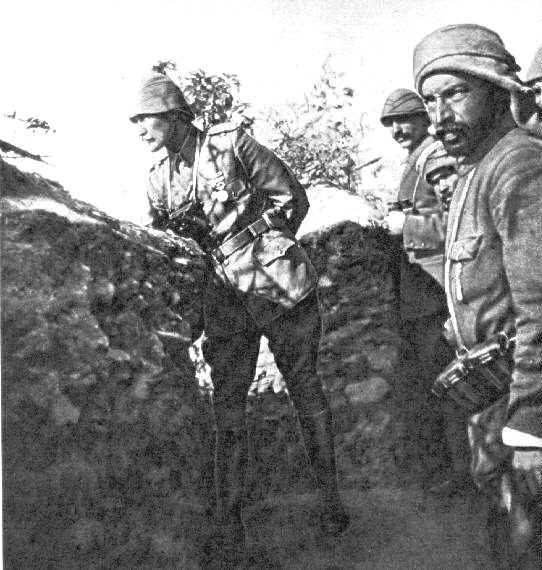 |
|
|
|
|
 |
Liman Von Sanders,
|
Liman Von Sanders was accompanied by some forty German military officers whose task it was to train and improve the efficiency of the Ottoman Army. It should be noted that British Admiral Arthur Limpus commanded the Ottoman Navy whereas the Ottoman gendarmerie had a French commander.2 The British Military Attaché in Constantinople Lt-Colonel Tyrell noted that the presence of German officers would offer “direct commercial advantage to Germany, as enormous quantities of military material of all kinds must be purchased.”3 The Russian Foreign Minister Sazanov believed that Von Sanders appointment would give Germany complete political power in Constantinople. Russia had its own designs on Constantinople.4 The British Ambassador in St Petersburg, Sir George Buchanan informed Foreign Secretary Sir Edward Grey that “rightly or wrongly the Russian Government believe that the German Government are endeavouring to acquire a veiled protectorate over Constantinople and that, though the Straits and Bosphorus are outside General Von Sanders’ jurisdiction, he will be in a position to exercise an indirect control over them.”5 The Ottoman Grand Vizier dispelled any idea that Von Sanders would command the defence of the Bosphorus and Straits “nor have any control of the city during a state a siege.”6 After a flurry of diplomatic exchanges between the European powers, Liman Von Sanders was appointed a Marshal in the Turkish army and dropped the command of the 1st Army Corps. This helped to quieten down the situation for a short while.7 During the Gallipoli campaign in 1915-16, the 5th Ottoman Army was commanded by General Liman Von Sanders. It was at Gallipoli that Kemal established his reputation as a fine soldier displaying courage, bravery and inspiring his troops to defeat the British Empire.Y Küçük says after Gallipoli Kemal was not promoted. His commander Esat Pasha was promoted instead. Kemal resented the involvement of German officers in the Ottoman Army. This did not create good relations between himself and Liman Von Sanders.8 Even allowing for such differences, Von Sanders lauded the future Turkish President in very complimentary terms. He stated that “ Kemal, who had achieved his first military success in Tripolitania was a commander willing to take on duties and responsibilities. On 25 April he used his own initiative to join the battle with his 19th division and pushed the enemy back to the beaches. Then for three months he
3GP Gooch & Temperley, op cit., p.351 4ibid., p.366 5ibid., p.413 6ibid., p.385 7ibid.,p.421 8Mango, op cit., pp.145-8 & 155-6; Patrick Kinross, Ataturk:the rebirth of a nation, Phoenix Press, London, 2001, pp.73-81& 82-95; İsyan, 2004 p.257 (I wish to thank Dr Racho Donef for bringing this Turkish source to my attention) |
|
| About the Author Stavros Terry Stavridis was born in Cairo, Egypt in 1949 of Greek parents. He migrated to Australia with his parents in September 1952. Stavros has a Bachelor of Arts (B.A) in Political Science/Economic History and B.A (Hons) in European History from Deakin University and M.A in Greek/Australian History from RMIT University. His MA thesis is titled "The Greek-Turkish War 1919-23: an Australian Press Perspective." Stavros has nearly 20 years of teaching experience, lecturing at University and TAFE (Technical and Further Education, the equivalent of Community College in the US) levels. He has presented papers at international conferences in Australia and USA and has also given public lectures both in Australia and on the West Coast of the US. Many of his articles have appeared in the Greek-American press. He currently works as a historical researcher at the National Center for Hellenic Studies and Research, Latrobe University, Bundoora, Victoria, Australia. Stavros' research interests are the Asia Minor campaign and disaster, Middle Eastern history, the Assyrian and Armenian genocides, Greece in the Balkan Wars 1912-13 and the First World War and history in general. HCS maintains a large selection of fine pieces written by Mr. Stavridis which viewers are invited to view at the URL http://www.helleniccomserve.com/stavridisone.html Read More About the Greeks of Asia Minor HCS readers who enjoyed this article may wish to view others about Smyrna and Asia Minor in our section specially created for these topics at the URL http://www.helleniccomserve.com/smyrnaopener.html. We also maintain a permanent, extensive archives of articles which readers are invited to browse at the URL http://www.helleniccomserve.com/archivesmyrnaasiaminor.html . |
|
|
|
|
|
|
|
2000 © Hellenic Communication Service, L.L.C. All Rights Reserved. http://www.HellenicComServe.com |
|
